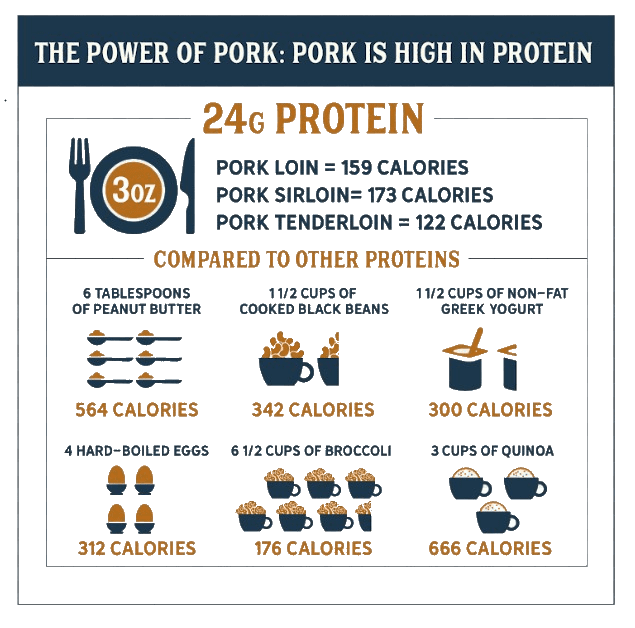We all know that a big percentage of our daily calories should come from protein. The Institute of Medicine suggests 20 to 30 grams per meal because protein supports muscle mass and function. How does pork stack up against other meats? Check out these pork nutrition facts.

More Pork Nutrition Facts
But there’s more to pork than just the protein. This meat comes packed with plenty of beneficial nutrients. See the chart below for a deep dive into everything you need to know about the nutrients in pork.
| Nutrient | % Daily Value | Why It’s Good for You |
| Iron | 5% | Getting enough iron is a problem for some women, especially women of child-bearing age. Heme iron (found in meat) is absorbed more readily than non-heme iron (found in plant-based foods). Thus, people who avoid meat without the help of their health professional may increase their risk of iron-deficiency anemia. |
| Magnesium | 6% | Important for the normal function of many enzymes (catalysts for the body’s chemical reactors), glucose and muscle action. |
| Phosphorous | 20% | Strengthens bones and generates energy in cells. |
| Potassium | 11% | This mineral, also known as an electrolyte, plays a major role in water balance and helps maintain normal blood pressure. |
| Zinc | 14% | A component of more than 70 enzymes, zinc is a key player in energy metabolism and the immune system. |
| Thiamine | 54% | Without this key vitamin, metabolism of carbohydrates, protein and fat would be significantly compromised. Animal protein is one of the best sources of this nutrient, and among the choices, pork is tops. |
| Riboflavin | 19% | Next to milk, there are few foods that have as much riboflavin per serving as pork. Riboflavin has an important role in the release of energy from foods. |
| Niacin | 37% | Important for the normal function of many enzymes in the body and involved in the metabolism of sugars and fatty acids. |
| Vitamin B12 | 8% | Helps build red blood cells and metabolize carbohydrates and fats. |
| Vitamin B6 (Pyridoxine) | 37% | Important for the normal function of enzymes and co-enzymes, which are needed to metabolize protein, carbohydrates and fats. Plus, it plays a critical role in the regulation of glycogen (stored carbohydrates) metabolism. |
See more pork tips.

